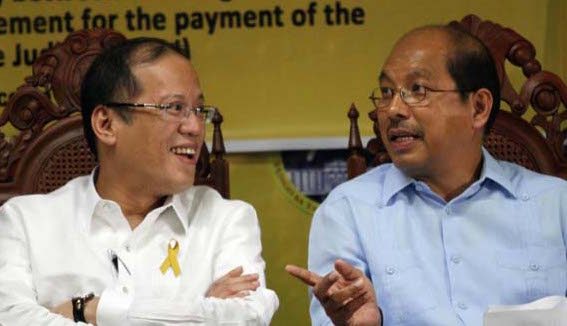SUMMARY
This is AI generated summarization, which may have errors. For context, always refer to the full article.

MANILA, Philippines – Former president Benigno “Noynoy” Aquino III stood firm that he doesn’t have any criminal liability over the Disbursement Acceleration Program (DAP) and that he shouldn’t be indicted for usurpation of legislative powers.
Usurpation of legislative powers means encroaching on the authority of the Congress – which former budget secretary Florencio “Butch” Abad was found to be liable for when he signed a budget circular that paved the way for DAP.
Abad had already been indicted for usurpation, but according to Aquino it is wrong to say that just because his budget secretary was held liable, he should be too.
According to Aquino, all he did was augment the budget with what had been declared as savings, and that, he said, is part of his “core executive functions,” Aquino wrote in his comment submitted to the Office of the Ombudsman, a copy of which was obtained by Rappler on Friday, May 12.
It was the Department of Budget and Management (DBM), Aquino said, that determined the availability of savings.
“While Congress could appropriate, it would have nothing more to do during the Budget Execution Stage. The determination of the availability of savings is the technical province of the DBM,” Aquino said.
Usurpation
Abad was indicted because, according to Ombudsman Conchita Carpio Morales, he was liable for signing National Budget Circular (NBC) no. 541, which directed the withdrawal of unobligated allotments. NBC no. 541 is the document that facilitated DAP.
“In the complainants’ view, the issuances would not have been effective without respondent’s approval, thus a finding of probable cause to indict Respondent Abad of usurpation should necessarily include the approving authority. Complainants’ contention is simply misplaced,” Aquino wrote in his comment.
The former president was responding to the motion for reconsideration filed by complainants Bayan Muna that seeks to return graft and malversation charges against both Aquino and Abad, and to have Aquino indicted for usurpation.
Quoting the law, Aquino also said it is explicit about what constitutes usurpation: “…any public officer who shall encroach upon the powers of the legislative branch of the Government, either by making general rules or regulations beyond the scope of his authority, or by attempting to repeal a law or suspending the execution thereof.”
For Aquino, even if it is established that he did something wrong in the implementation of DAP, he cannot be charged for usurpation because the criteria are not met.
“An act that is purely executive or judicial in nature will not fall under the definition of usurpation of legislative powers, even if such act is contrary to law, because such act does not encroach upon the powers of the legislative branch,” Aquino said in his comment. (READ: Accountability over DAP: What’s happening with the probe?)
‘No bad faith’
When the Ombudsman dismissed the graft charges against Aquino and Abad, it was because they did not find that there was bad faith in DAP and that it did not cause undue injury to the government, giving credit to the Aquino administration’s repeated claims that DAP boosted the economy.
The complainants asserted that there was bad faith because when Aquino was a senator, he filed the Budget Impoundment Control Act which sought to give Congress the final say in appropriation.
Aquino said the bill is immaterial because it refers only to impoundment of funds, when the DAP involves the transfer of funds.
“The Supreme Court has categorically pronounced that the acts committed through the DAP should not be regarded as impoundment because it entailed only the transfer of funds,” Aquino said.
Aquino also addressed the complainants’ allegation that the transfer of funds put other agencies at a disadvantage when they lost the power to hire manpower and give benefits to their employees because their savings had been transferred.
Aquino countered that they do not have proof because they failed to specify which agencies suffered the loss and in which way they suffered.
“This only goes to show how miserably overeager they are to conjure claims of undue injury when none exists in the first place,” Aquino said. (READ: TIMELINE: The rise and fall of DAP)
Accountable official
The Ombudsman dismissed the malversation charges because Aquino and Abad are not “accountable public officials” who could be charged with malversation. Accountable officials are only the ones who have custody or control of the funds such as a treasurer or a cashier.
The complainants appealed this, saying they are charging Aquino and Abad for “technical malversation” and not malversation. Under technical malversation, the accountable official requirement is removed and penalty goes to any “official who applies any public fund to any public use other than for which such fund was appropriated by law.”
For Aquino, there is no distinction between malversation and technical malversation. The former president subscribes to the Ombudsman’s resolution that only an accountable officer can be charged for malversation.
And who’s the accountable officer? Aquino cited the government auditing code: “An accountable officer is every officer of any government agency whose duties permit or require the possession or custody of government funds or property and who shall be accountable therefore and for the safekeeping thereof in conformity with law.”
The Ombudsman has been criticized for sparing Aquino in the DAP indictment. In April, Morales said they had taken up the offer from the DBM to be furnished with crucial documents to aid them in their investigation.
Budget Secretary Benjamin Diokno has said in media interviews they are protecting crucial documents which could lead to holding more officials liable, “even the (former) President.”
The Department of Justice is also conducting its own investigation which stemmed from allegedly fresh evidence. – Rappler.com
Add a comment
How does this make you feel?
There are no comments yet. Add your comment to start the conversation.